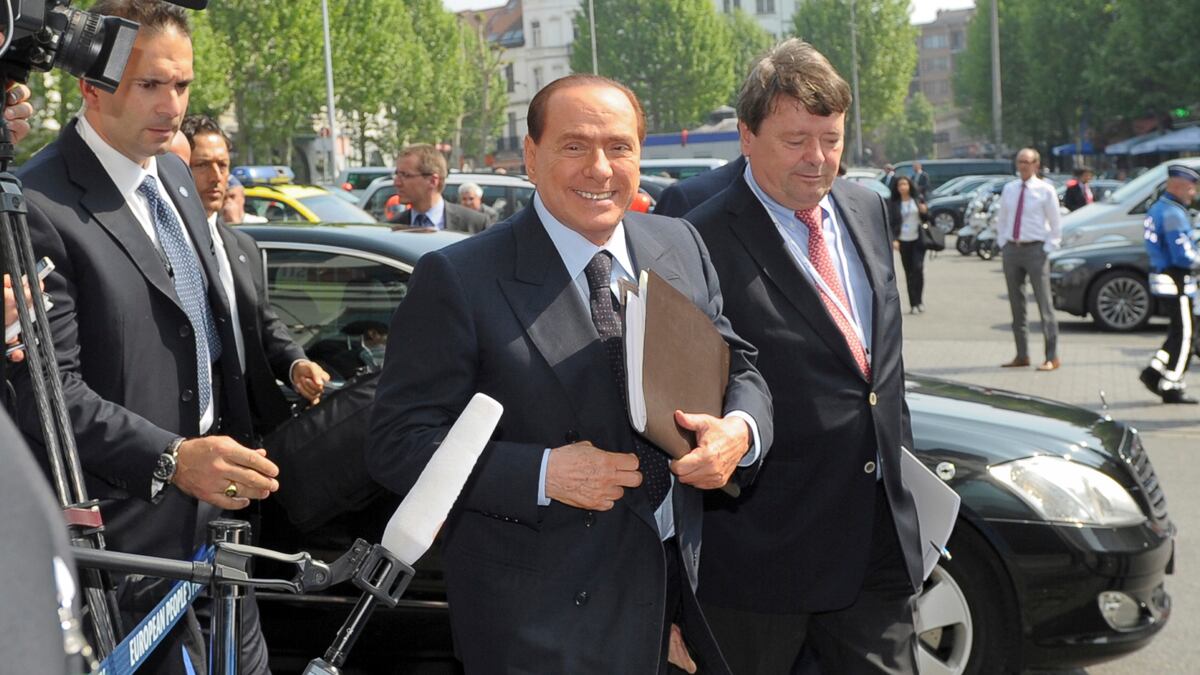Silvio Berlusconi is back in Italian headlines, but not for his peccadilloes or corruption trials. The 75-year-old media mogul is setting the stage for a full-fledged political comeback. After weeks of speculation, Berlusconi finally addressed his party faithful on June 27, assuring them he won’t likely run for prime minister in the next elections, slated for 2013—that job would go to his political protégé, Angelino Alfano. Instead, he has his sights set to be Italy’s economy minister. The catch—and there is always a catch with il Cavaliere—is that his Party of Freedom political arm will aim to swing back into power on an anti-euro platform, riding the wave of euroskeptism that is gripping Italy.
Over the course of the last three weeks, Berlusconi has been using the growing angst over euro-zone currency membership to maneuver his way back into the hearts and minds of Italians. Over 60 percent of Italians polled in late May said life was better with their old lira currency. Stories of widespread poverty in Greece and bank runs in Spain have added fuel to the anti-euro fire. Berlusconi, obviously keeping a mindful eye on Greece, where the New Democracy Party performed admirably on an anti-euro-zone ticket, sees his political future as an alternative to the status quo. Three times since those anti-euro polls, Berlusconi has called for Italy to leave the currency, including one slightly bizarre rant in which he suggested Italy might consider printing its own euro notes, basically counterfeiting the official currency. On Wednesday, he wrote on his Facebook page, “Leaving the euro is not a blasphemy.”

Berlusconi’s push back to the center ring has been buoyed by a growing distrust for his successor, technocrat Mario Monti, who was assigned the dual roles of prime minister and finance minister when Berlusconi was heckled out of office last November amid an economic crisis that nearly sent Italy into default on its $1.9 trillion debt. Monti initially enjoyed wide parliamentary support and a post-Berlusconi honeymoon, but he has since fallen short of passing vital reforms the country needs to keep its financial books in order. He has successfully tightened the noose on thousands of Italian tax-evaders who are now paying stiff fines and penalties for years of evasion. But he has lost considerable favor by being soft on Italian parliamentarians, whose salaries are still among the highest in Europe despite austerity measures that are choking the general population, and for turning a blind eye to the Vatican, which enjoys significant tax benefits for properties outside the official boundaries of the Vatican city-state. Berlusconi initially supported Monti’s mandate, but this week, he announced that now 78 percent of his party followers “do not agree in supporting the government’s policies any longer.”
If Monti loses any of the upcoming crucial votes of confidence on key austerity measures, the effects could be catastrophic. Widely referred to as “Merkel’s helper” in European circles, Monti’s alliance with Merkel—amid growing anti-German sentiment for the country’s harsh line on euro policies designed to help struggling nations like Greece, Spain, and Italy—has drawn little favor at home. On Thursday, Monti attended a European Union meeting of finance ministers, presenting a eurobond plan that would have theoretically helped weaker economies through collective debt-sharing. But Merkel vetoed the idea. Even European parliamentarians were baffled. “I think we should stop talking about eurobonds now because, with the German government’s ‘no,’ with this definitive ‘no’ from Mrs. Merkel, eurobonds are now a non-issue,” European Parliament President Martin Schulz told a German television station after the Brussels meeting. “I personally continue to see it as a good solution, a sensible one, but there is no sense in conducting theoretical debates when the house is on fire.”
Berlusconi has predicted Monti’s mandate won’t last another two months, which may be a warning shot in terms of his intentions, since his party has enough of a showing in Parliament to cause the collapse of Monti’s government if he should choose to withdraw support. That would send the country into an election panic mode, which may work well for Berlusconi’s party’s chances for regaining power. Even the country’s president, Giorgio Napolitano, addressed fears that Monti’s days are numbered. “It’s worrying that the disputes and conflicts are increasing among the parties who support the government,” he said after mildly complimenting Monti’s efforts at reform.
Monti’s approval rating has hit a new low, at 33 percent this week, down from from 71 percent when he took office. Berlusconi’s party’s popularity is on the rise, climbing 15 percentage points in just three days after announcing their anti-euro platform. “Give me just 51 percent of the vote and I will lead our country out of this crisis,” he said this week at a party rally.
But where he would lead them to from there is the real question on every European’s mind.






